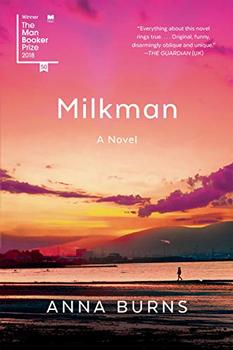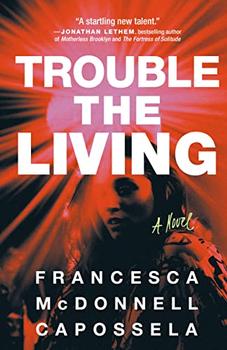Summary | Excerpt | Reviews | Beyond the book | Read-Alikes | Genres & Themes | Author Bio

Since Northern Irish author Anna Burns' third novel Milkman unexpectedly won the Man Booker Prize last October (See Beyond the Book), nearly every reviewer of the work has acknowledged it as challenging, and it's not difficult to see why. The 360-page novel has only seven chapters, little dialogue or action, and a narrator prone to sudden digression. Reactions have been polarized. The book requires a great deal of effort to finish; people will either find the emotional payoff to be worth the arduous reading experience, or they won't.
Set in the late 1970s in an unnamed Northern Irish city not unlike Belfast, Milkman features an eclectic cast of characters struggling to navigate their community during a time of armed conflict and heightened social tensions. The story takes place 11 years into the Troubles, a 30-year period of fighting between Catholic and Protestant paramilitary groups. The former wanted Northern Ireland to unify with the rest of Ireland, while the latter wished to remain under British rule.
The plot is simple. From the vantage point of the present, the obliquely named "middle sister" narrates the trials she faced at age 18 living in an urban war zone, an inhospitable environment where "you created a political statement everywhere you went, and with everything you did, even if you didn't want to."
The protagonist's problems as a teenager were threefold. Since her 16th birthday, middle sister recollects, "ma had tormented herself and me because I was not married." Worse yet, upon turning 18, she found herself inexplicably stalked by the titular milkman, a lecherous 41-year-old married paramilitary leader who threatened to wreak havoc on her life if she resisted his advances. Adding to the girl's litany of troubles, her community gossiped about her; they claimed she was having "a love affair with the milkman," and mocked her for her peculiar tendency to "walk home reading [her] latest book" in the midst of urban warfare.
Scenes of domestic strife, sexual intimidation and social ostracism play out against the backdrop of the political violence of the Troubles, which are mostly a distant threat in the novel. Very little happens in terms of plot. The adult narrator instead offers surprisingly droll, verbose reflections on the hardships of having come of age in a place "sunk into one long, melancholic story," where to be "shiny," or noticeable, was to be "bad, which meant you had to go around not being anything."
Again and again middle sister circles back to detailing the ways in which the pressure to be unremarkable was especially heavy for women. Men on both sides of the Troubles expected women to act as adoring, self-effacing "paramilitary groupies," she remembers, and those who spoke out about "injustices and trespasses against women" were swiftly marginalized and "placed in the category of those way, way beyond-the-pale." The fairly apolitical narrator even found herself being harassed for the minor eccentricity of reading 19th-century novels like Ivanhoe and Martin Chuzzlewit, which provided her a much-needed escape from "modern-day, fraught, involved stuff."
Middle sister's testimony makes it clear that a culture of surveillance oppressed all the women in the unnamed city, limiting their agency, and the novel is in large part an examination of how the narrator endured rampant male paranoia while growing up as a female "psychological misfit," "slotted out there with those other misfits on the rim."
The story of the novel, while unfolding during the Troubles, feels like it could happen in any patriarchal society during a time of war. The political conflict is reduced to a battle between "defenders-of-the-state" and "renouncers-of-the-state." Characters are named for their relationship to the narrator ("maybe-boyfriend," "first brother-in-law") or for one of their hobbies or quirks ("chef," "tablets girl"). While the setting isn't quite universal, it is generalized, making the story accessible to those not familiar with the history of Northern Ireland.
The prose is complex but engaging. The language is sometimes overly elaborate and disorienting, but mostly plain and easy to read; lengthy sentences and paragraphs unfurl at a measured pace, and stunning images of light, darkness and "shininess" flicker throughout. Middle sister's sharp wit and black humor push the narrative forward, even in its bleakest moments, toward a memorable conclusion.
Thoughtful and deliberate, Milkman offers incisive commentary on gender socialization and the pressure to conform during an era of political instability. While the novel's experimental form and excessive introspection won't appeal to everyone, Burns has crafted an unforgettable tale about what it means to fall below "the benchmark of social regularity" at a time when difference is demonized.
![]() This review
first ran in the March 6, 2019
issue of BookBrowse Recommends.
This review
first ran in the March 6, 2019
issue of BookBrowse Recommends.

If you liked Milkman, try these:

by Colm Toibin
Published 2025
From the beloved, critically acclaimed New York Times bestselling author comes a spectacularly moving and intense novel of secrecy, misunderstanding, and love, the story of Eilis Lacey, the complex and enigmatic heroine of Brooklyn, Tóibín's most popular work twenty years later.

by Francesca McDonnell Capossela
Published 2023
From Northern Ireland to Southern California and back―a mother and daughter confront the violence of the past in an enthralling novel about the possibility of love and redemption during the most transforming and unsettled times.
Men are more moral than they think...
Click Here to find out who said this, as well as discovering other famous literary quotes!
Your guide toexceptional books
BookBrowse seeks out and recommends the best in contemporary fiction and nonfiction—books that not only engage and entertain but also deepen our understanding of ourselves and the world around us.